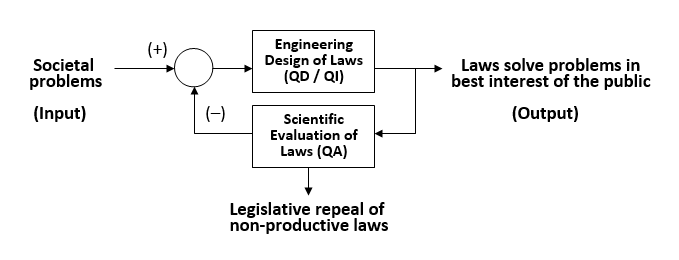SCIENTIFIC LAWMAKING
The scientific approach to lawmaking will cause a division of labor between 1) legislatures that set policies through open discussions and debate of societal issues of concern and that maintain the rule of law through the enactment and repeal of laws, and 2) scientific design and evaluation institutions that are contracted by legislatures to design and optimize laws that carry out legislative policies.
Under the aegis of scientific lawmaking, the role of a legislator will become limited to that of trustee of the people. Specifically, legislators will not be involved in the design of laws, for two reasons. First, the position of trustee will be a full time position, and trustees will not have the time to design laws. Second, the requirements for being a qualified designer of laws (e.g., PhD in law-design engineering) are far beyond the typical general-knowledge background of popularly elected legislators. Thus legislators will identify problems, discuss issues, and set policy but will assign, by competitive bidding or other open and responsible method, the design of laws to carry out their policies to qualified engineering law-design institutions.
The promise of this approach to lawmaking is that it will preserve the institutions and functions of democracy while bringing the full resources and ethos of science to bear upon the solution of societal problems by means of laws. As shown in accompanying figure, the legislature will discuss societal problems and propose policies to solve problems (input). The legislature will then contract with law-design institutions to apply engineering best practices (QD / QI standards) in the creation of laws (subsequently enacted by the legislature) that optimally solve problems in the best interest of the public (output).
In contrast with the Traditional Method of Lawmaking, which is a simple input-driven Feed-Forward Control System, scientific lawmaking will incorporate a quality assurance (QA) "feedback loop" that will evaluate the structure and performance of every law. The QA program will be performed by the investigative science of laws. Those laws that cannot be demonstrated to satisfy the purpose of democracy (i.e., non-productive laws) will be submitted to the legislature for repeal. By this means the lawmaking process will be transformed into an output-driven Feedback Control System that optimally solves problems in the best interests of the people, which is the purpose of democracy.

Scientific Lawmaking Science-derived quality programs for laws (QD, QA, and QI) will transform the lawmaking process into a problem-solving Feedback Control System that is self-correcting in the direction of optimum outcomes for the citizenry. By this process, lawmaking will be transformed into a knowledge industry and will accomplish the public benefit purpose of democracy.
With each cycle of the scientific lawmaking process, the sophistication of design and evaluation methods will improve, knowledge of the mechanics of laws will increase, the size and complexity of the bodies of laws (and of the government) will be kept to a minimum, and the performance of laws will improve in terms of effective problem solution, cost-efficiency, and safety. In other words, the performance of the science of laws, as determined by improved levels of human rights, living standards, and quality of life standards of the people will, predictably, come to match the patterns of success that now characterize every other field of science such as electronics, aeronautics, and pharmacology.